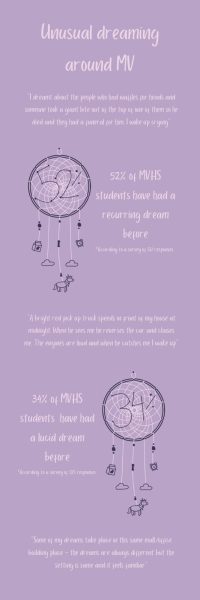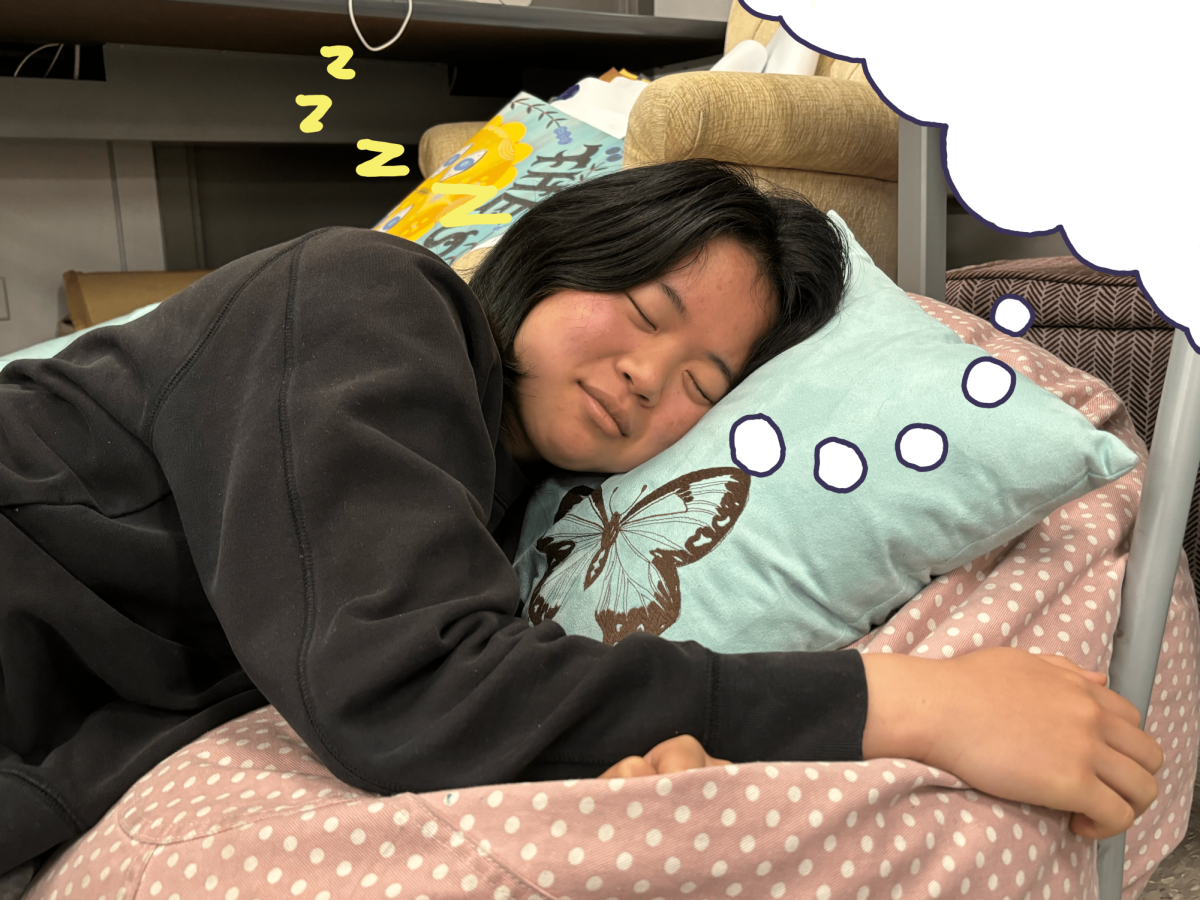Sophie Minogue
SM: It was a normal dream at first, and I was walking around my house. And then I got into bed, and then I realized, ‘Oh, this is a dream, right?’ And then I tried to wake up, but then I stopped being able to move. And then the world filled up with smoke, and then I couldn’t breathe and then I woke up.
EE: Junior Sophie Minogue has always had vivid dreams. Starting in high school, however, Minogue began to experience sleep paralysis, suddenly becoming unable to breathe or move in her dreams before waking up, relieved for it to be over.

SM: The first time it was really weird — it was the most vivid. I just woke up in my room and I was able to walk around, so it was kind of like a lucid dream. But I just couldn’t wake up and I wanted to get out of it.
EE: Minogue is not quite sure why she gets sleep paralysis, but believes the dreams are linked to stress, noticing a correlation when she has many tests or finals. She says she gets the dreams around once a month and has figured out how to manage them.
SM: Even though you can’t move in the dream, trying to do something, like trying to flex your muscles. Sometimes what I try to do is close my eyes really hard and then open them. And sometimes I’ll wake up in real life. I think just find a way to get out of it, because you shouldn’t stay in a dream because it’s just stressful and it’s scary.
EE: Although Minogue doesn’t usually tell others about her sleep paralysis, she says the people she does tell are usually surprised and interested in her stories. However, she also feels that there are a lot of stigmas around sleep paralysis and that experiences vary between different people.
SM: A lot of like, ‘Oh, you have demons now?’ or like, ‘You have these things haunting you?’ And that’s like, ‘Oh, you’re crazy.’ Whenever I talk about it, I feel the need to sort of clarify that I never get people visiting me in these dreams.
EE: Minogue is no stranger to unusual dreaming experiences, and in addition to sleep paralysis, she had a recurring dream when she was younger.
SM: It was in my elementary school. We have a field and then there’s a playground, so it was in the playground, and then, the playground has a fence that leads to the roads, but that fence actually had a magic door that led to a meadow that was super green. It was super bright. And then that meadow also had another secret door to a more magical world where all the unicorns lived.
EE: Although she only had the dream around three times, Minogue says she has thought about it often.
SM: The first time it was just like a normal dream. But then seeing it again, I was like, ‘Ooh, maybe the world is giving me, I don’t know, some sign.’
Aarna Burji
AB: I’ve been at my house [and it was] along the lines of, ‘Uh-oh, someone’s following us. Uh-oh,Someone’s parked outside our house and he looks like he wants to kill us. Uh-oh, I have to play hide and seek with my killer neighbors in our neighborhood. Uh-oh, who’s our new neighbor?’ A lot of them just have me running away in different places around my neighborhood.
EE: From childhood, junior Aarna Burji has always had vividly eventful dreams that she believed were manifestations of emotions she did not fully think about or understand while she was awake. As she grew up, she began to interpret these dreams better.
AB: My dream started getting very story-like. They would have plots and settings and everything would have to make sense. Not everything, obviously. Dreams don’t always make sense. But the chronology, like the sequence of the dream, would have to make sense.
EE: These dreams, specifically the recurring ones for Burji, often manifest in the form of nightmares where she is being chased. Often in her home, the dream itself feels like a horror movie, with suspense building as she checks corners and hides from the killer.
AB: I don’t want to sound pretentious but I like the fear of being chased. It’s very haunting and it makes me feel very uncomfortable and very scared. But maybe I’m just so used to it by now that I look forward to [thinking] ‘Oh, will that person be there if I turn the corner? Oh, will I make it across the fence on time?’ That sort of thing. I also know every single time I have one of those dreams, I feel a sense of satisfaction every time I reach safety.
EE: There are certain nights, though, where her nightmares are based on more realistic situations and fears. For example, Burji is extremely particular about her sleep schedule, as she dislikes the potential of being late to school. This is then reflected in a recurring nightmare where her morning routine goes awry.
AB: I’ve never pulled an all-nighter before. So every time I have that recurring nightmare, it’s because I’ve stayed up all night watching TV or not doing something I’m supposed to be doing. Then I wake up and I’m like, ‘Oh no, the sun’s out. It’s 8:30 and I’m late for school.’ Then I go to school and everyone’s disappointed. I have to lie to my parents. I have to be like, ‘Yeah, I went to school on time,’ and I have to lie to everyone and I’m late to school. I’m tired. That’s the ultimate nightmare.
EE: Ultimately, Aarna admits that, while her dreams often take scary forms, they bring a thrill to an otherwise boring night of sleep.
AB: I love waking up from a very eventful dream, even if it’s scary. Sometimes it’s too dark and it’s just what I hate. I hate that. But the running away dreams are never that dark. I just feel like a movie went in my head. That was eventful. That was fun. That was something interesting that I got to experience.
Ethan Chu
EC: I had this one recurring dream. When I was a child, I really liked grape juice. So, in my dream, I’m a baby and I’m strapped to my high chair at the dinner table. After refusing to eat something, my parents would take my cup of grape juice away and throw it in the trash. That has been a recurring nightmare since I was a child.
EE: Junior Ethan Chu has had a variety of dreams since he was young, varying from flying to being chased to even being a baby version of his current self. These dreams evoke many emotions, which he found hard to deal with when he was younger but has eventually grown accustomed to.
EC: I’ve gotten used to that [dream] because the emotions I feel are just part of the dream. So when I wake up, I’m not connected with those emotions. But for other more scary nightmares, when I was a child I’d wake up and be scared to go back to bed. So I’d go into my parents’ room and sleep with them.
EE: Now, as a junior, he has learned to deal with these vivid emotions, slowly disconnecting himself until later in the morning when he can move on.
EC: I don’t think that it affects me too much. Once I’m done with my daily morning routine, I pretty much forget about it.
EE: Chu believes that dreams are often read too deeply into than necessary. Instead, Chu says the randomness of his dream proves to him that he can separate experiences in his dreams from his real self.
EC: I’ve heard that dreams might be associated with something that happens in your real life, but I don’t believe in that. I think that they are just random.
Music credits: HoliznaCC0 – So Broke


















